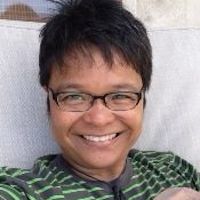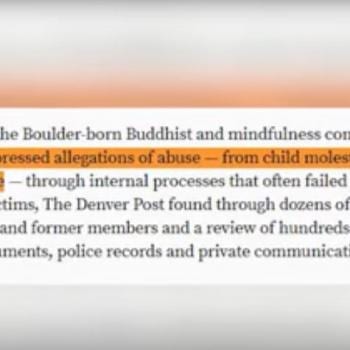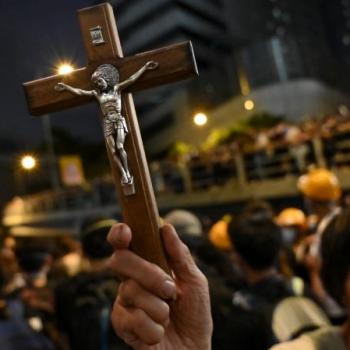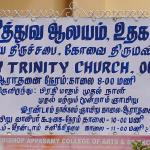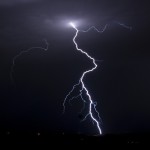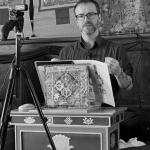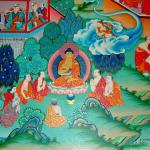This year we mark Pride Month with a re-run of an article first published in 2015. Enjoy. Along the way, a wonderful collection of works by trans, genderqueer, and nonbinary practitioners of Buddhism has been published: Transcending: Trans Buddhist Voices (North Atlantic Books 2019).
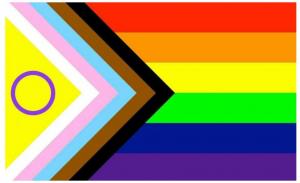
Today I am delighted to introduce readers to La Sarmiento, a long time Vipassana meditator and teacher who will be co-leading a retreat at the Garrison Institute called “Embodying Presence in Our Lives: A Mindfulness Meditation Weekend for Lesbian, Gay, Bisexual, Transgender, Intersex, and Queer Communities” in April along with fellow teachers Madeline Klyne, Eric Kolvig, PhD, and Jacoby Ballard.
Many thanks to Sam Mowe of the Garrison Institute for connecting us and to La for taking the time to do this interview.
~
What is the goal of this mindfulness meditation weekend? How many and what kinds of people do you expect to participate?
There are very few opportunities for the LGBTIQ (Lesbian, Gay, Bisexual, Transgender, Intersex, and Queer) community to practice mindfulness meditation together. Historically, my 2015 Garrison LGBTIQ Retreat co-teacher Eric Kolvig along with lesbian dharma teacher Arinna Weisman pioneered LGBT (the “I” was no yet a part of the acronym) retreats over 20 years ago. A large LGBTQ retreat has been held at the Spirit Rock Meditation Center in Woodacre, CA for many years since. Three years ago, my mentor Larry Yang along with Madeline Klyne offered the first large east coast LGBTIQ retreat at the Garrison Institute in Garrison, NY, and now the Insight Meditation Society in Barre, MA has begun offering an annual LGBTIQ retreat there. The aspiration of such retreats is to create a safe, compassionate, and nurturing space for LGBTIQ yogis to deepen their practice in an environment where who they are and their experiences are reflected by the retreat teachers and where they are surrounded by others who may share similar and diverse experiences of being LGBTIQ in this culture.
We hope to have between 80 – 100 yogis participate, who identify in the continuum of the acronym LGBTIQ from various racial, ethnic, socio-economic, age, religious/spiritual, political, etc… backgrounds.
This is a rather unique retreat in that it has four teachers. Is there a particular reason for having several teachers rather than just one?
The LGBTIQ community is so diverse on many levels. Having four teachers provides an opportunity for members of the retreat sangha to be reflected in some way. It also creates exposure and raises consciousness to the diversity within our own community, which is slowly but surely expanding – especially with regards to gender identity.
What has your experience been as a gender non-conforming person in Buddhism (on a personal and/or community level)?
It’s only been in the past 2-3 years that I have “come out” yet again as a gender non-confirming person. Since the age of five, I was aware that who I felt I was inside did not match my biological sex or physical body, especially as I got older. Growing up in the 70’s, queer consciousness did not go beyond being gay or lesbian. Though at five I also realized that I was attracted to girls and not boys, identifying as a lesbian in my early 20s didn’t resonate either, but it was easier just to go with that label (which was hard enough at that time) than to identify differently. It took me til my early 40s to realize that I did not want to transition to become a man. I so honor and respect my transgender siblings who make the choice to transition, yet for me it didn’t feel quite right either. I’ve always felt somewhere in between.
Personally, it’s been a challenge to come out over and over again. Discerning whether it is safe to do so with family, friends, acquaintances, strangers. It would be great if our culture as a whole just would not assume one’s gender identity to begin with so that the conditioned references regarding the binary (male/female) can slowly be eliminated.
As a dharma teacher and retreat manager, I often come out as genderqueer or gender non-conforming to liberate myself and be my truth as well as to let other transgender yogis know that they are not alone in dominant culture retreats (even LGBTIQ ones). Each time I’ve come out to retreat sanghas or my home sangha, the Insight Meditation Community of Washington (IMCW), I’ve felt seen and accepted in those moments. When it comes to using my pronouns they, their, and them, it’s another story.
That’s an excellent point. I can imagine that a lot of people will have a hard time stepping away from gendered pronouns and using they, their, and them when referring to you in the third person (especially for grammar-sticklers!). Can you say more about why you do this and how it has changed the way people interact with you?
I use the pronouns they, their, and them because I feel that I embody both female and male energies (and everything in between). So technically, it is plural! : ) The gender binary and all associated with it is so deep. It’s the first way we are identified when we’re born. In an interview when celebrity Tina Fey was pregnant, the host asked, “What is the gender of your baby?”. Tina Fey, without missing a beat said, “I won’t know til they go to their senior prom.” There are myriad ways that we project identity on others without knowing how they see themselves.
When I let others know my pronouns, I’m often met with “But that’s not grammatically correct.” I could go into a whole grammar lesson and give examples of how those pronouns are used in the singular, and I choose not to here. What’s most important when a gender non-conforming person asks you to use a certain set of pronouns is to simply use them. No questions asked. It’s about respecting the individual’s need and meeting it. Yes, it’s awkward and uncomfortable to change our language, and it’s been incredibly awkward and uncomfortable to be a gender non-conforming person in a gender binary world! I believe that true inclusion means that we’re going to bump up against the way things have been and to develop, with patience and perseverance, a willingness to change.
There’s a great recent article in Feministing called “How using ‘they’ as a singular pronoun can change the world” that I’ll link to here and at the bottom that explores the grammar issue in further detail.
How has Vipassana meditation impacted your sense of both gender non-conforming and a person of color in this world which privileges the cis-white-male so much?
Vipassana meditation and mindfulness has deepened my practices of patience, acceptance, forgiveness, and compassion. It has allowed me to accept that “it’s like this right now” and that through skillful action and wisdom, we can turn around the suffering that stems from oppression and misused privilege. In all the work I’ve done within dharma communities with regards to issues of diversity and inclusion, what I’ve grown to realize (through much internal and external struggle) is that it is a process, one that takes much time and skillful effort. Vipassana and mindfulness have fostered courage to free my heart and mind to fully examine my internal experience of oppression and how to feel empowered again and again to meet a world of outward oppression.
The teachings of “learning to stay” as Pema Chodron often refers to, as well as getting that my relationship to what is happening will determine my suffering or my freedom have been crucial in my practice of living in a world where injustice and oppression exists. Being open to however life is unfolding and being willing to have my heart broken open over and over again in order to break my own habitual conditioning is my practice. This approach for me is energizing and not draining. (And believe me, I’ve been drained!)
Speaking of this work as a process suggests an at least cautiously optimistic outlook on Western Buddhism becoming more inclusive. What are the biggest hang-ups we as a culture or religion in the West still have? What steps should be taken now and in the future to make the Dhamma more available and inclusive?
I believe that Western Buddhism is slowly becoming inclusive. The biggest hang-ups that we as a culture or “religion” in the West still have is the misinterpretation of the teachings that “We are all one” and that there is “no self”. I believe this to be true in the absolute sense and not so much in the relative or mundane sense. All beings are not treated equally, some have more privileges than others, and many are oppressed by those in power – which in our culture and in Western Buddhism tend to be cisgender, white, straight men. Even within some Buddhist monasteries all over the world, patriarchy exists.
Last year, several Buddhist transgender yogis, including my Garrison LGBTIQ Retreat co-teacher Jacoby Ballard and myself, helped create a document entitled “Developing Trans*Competence: A Guide For Meditation and Retreat Centers” (http://transbuddhists.org/retreat-guide/about-the-guide/) to raise awareness about the issues faced by transgender yogis attending retreats. I wish that this existed when I started practicing 16 years ago as I have often felt uncomfortable using multi-stalled, single-sex bathroom and shower facilities given how frequently I have been questioned for being there.
With regards to steps we can take now and in the future to make the dhamma more available and inclusive, we can start with unabashed self-examination of our conditioned beliefs, stories, traumas, and histories through the practices outlined by the Buddha as well as a greater understanding of our own shadow aspects of our personalities through whatever form of therapy or modality that deepens self-understanding. Creating practice spaces for LGBTIQ, people of color, women, young people, etc…offers a refuge for these groups to feel seen, heard, and respected amongst their peers in a way that may not always happen in dominant culture spaces. I have been the guiding teacher/leader of the IMCW People of Color and LGBTQ sanghas for the past 9 years and have seen how much they have meant to yogis in deepening their efforts in practice within community. Such groups have existed and exist at New York Insight in New York City, the East Bay Meditation Center in Oakland California, and the Cambridge Insight Meditation Center in Massachusetts. Developing more practice spaces for interactive relational dharma so that we can embody and employ wisdom through wise speech and action is also key. In my own experience, I feel it necessary that both the privileged and oppressed practice deep humility and courage to begin to examine and take responsibility for how they enter into and interact in situations/conversations/communities. I have found that having a foundation of relationship based on mutual trust and respect allows folks to hang in there with each other when having the often difficult and challenging conversations regarding diversity and inclusion issues.
Maybe once we’ve learned how to be together in a way that creates unity and honors difference we can then begin to do the work of truly dismantling systems and institutions that prevent us from alleviating the suffering of and cultivating true happiness for all beings everywhere without exception.
~
La Sarmiento has been practicing Vipassana meditation and has been a member of IMCW since 1998. La is a graduate of the Community Dharma Leadership IV program sponsored by Spirit Rock Meditation Center and is certified as a Teach .b Mindfulness Teacher with the Mindfulness in Schools Project based in the UK.
Since 2005, La has been the guiding teacher/leader of the IMCW Lesbian, Gay, Bisexual, Transgender, and Questioning (LGBTQ) Sangha and the IMCW People of Color Sangha and more recently they* also co-led the DC Monthly Teen Sangha for youth between 13 – 19 years of age.
For more information on La, check out their website, www.lasarmiento.com.
*La identifies as gender non-conforming and uses the pronouns they, their, and them when being referred to in the third person.
Additional resources:
Interview with the creators of Trans*Buddhists.org, American Buddhist Perspectives, Aug 2014
Sex redefined: The idea of two sexes is simplistic. Biologists now think there is a wider spectrum than that, via Nature, Feb 2015.
How using ‘they’ as a singular pronoun can change the world, via Feministing, Feb 2015.

